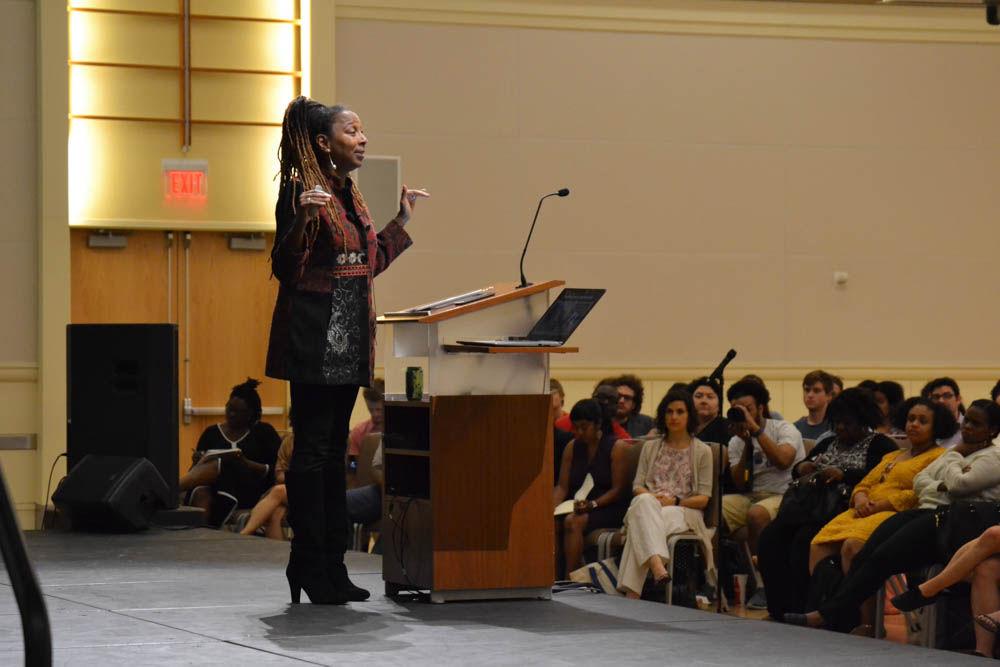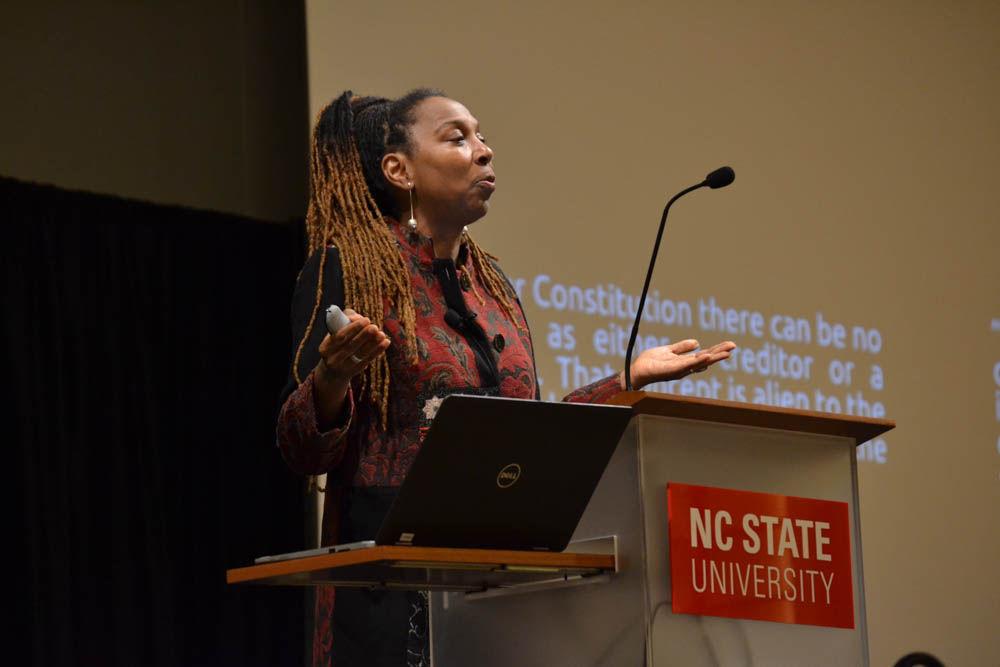Tuesday evening, students, faculty and staff filled the Piedmont-Mountains Ballroom in Talley Student Union to hear Kimberlé Crenshaw discuss intersectionality and race relations in America. Crenshaw’s lecture explored “intersectionality,” a term she coined in 1989, and how it relates to the #SayHerName campaign, which seeks to create visibility for the stories of black women who are killed by police.
The event was held as part of the 47th annual Pan-Afrikan Week, which is a week dedicated to educating about and celebrating African and African-American culture. It was presented by the Society of Afrikan American Culture and Interdisciplinary Studies.
Crenshaw opened by saying that North Carolina is “ground zero” for progressive social movements, making reference to the recently repealed “bathroom bill” and the state’s “scorched earth politics.” She also spoke about the conflict between those who wish to fight against political correctness and preferential treatment and those who fight for reparations for historical wrongdoings and social justice
Crenshaw called participants to action for social justice, encouraging them to interrogate and challenge systems of power.
“It is clear that right now we have to fight like our lives depended on it, because they do,” Crenshaw said.
Crenshaw spoke about oppression throughout American history, especially with respect to the treatment of African-Americans, and encouraged participants to resist the normalization of oppression by reexamining history.
“We need to recognize that the end of the first Reconstruction that ushered the blinding oppression of segregation and disenfranchisement wasn’t simply the product of people of goodwill being overcome by forces of hate and oppression,” Crenshaw said. “The redeemers won because the resistance collapsed.”
Crenshaw elaborated on intersectionality, the theory that social identities are interconnected and contribute to overlaps in an individual’s experience of discrimination or privilege.
“We need to embrace intersectionality within and across our movements,” Crenshaw said. “Not just as a term or a buzzword … but really embracing an intersectional vision for our social justice politics.”
Joelle Fuchs, a junior studying biological sciences, said that one of her primary takeaways from the lecture was the idea of many problems being intersectional and said that she was impressed by the manner in which Crenshaw talked about intersectionality.
“I think the way that the way she approached the topic and verbalized it made sense to a lot of people,” Fuchs said. “It’s going to get people to understand it a lot more.”
Crenshaw shared her personal experience with Harvard Law School’s administration after she suggested to hire a more diverse staff and teach a class on the relationship between race and law. According to her, they refused to create the course and hire black professors because they believed there were no qualified people of color who could teach at Harvard Law School.
Crenshaw responded to the administration by creating the course herself and gathering thirteen scholars of color from across the country to teach a cohort of students that eventually formulated Critical Race Theory.
“It was an intellectual movement forged in struggle,” Crenshaw said.
Crenshaw continued by criticizing institutions of higher education that have unsuccessfully implemented programs and policies intended to diversify their student populations.
“We come here under the framework of diversity,” Crenshaw said. “But who’s doing the diversifying and for what interests?”
Crenshaw continued her critique by proposing that some university administrations seeking a more diverse campus are doing so for “the wrong reasons.”
“For this generation of students, specifically students of African-American descent and students of color, [the administration’s] effort to integrate these spaces that previously excluded them was more about just sitting in the classroom to add a little flavor for the other students,” Crenshaw said.
Asia King, a junior studying business administration, reiterated Crenshaw’s questioning of university administrations’ motivations in seeking diversity in student admissions, and added that the student experience tends to be culturally insular.
“I feel like, especially here at State, even though we’re in this ‘diverse’ community, people stay in their bubbles and people stay in their circles,” King said. “They don’t usually go out of them, and that really bothers me.”
Assistant Dean for Diversity and Student Services for the College of Sciences Jamila Simpson participated in a breakfast discussion with Crenshaw, joined by other NC State faculty members. She stressed the need for more conversations between students, faculty and staff about the kind of space, culture and climate that they want to have at NC State.
“The systemic lens gets missed a lot and the truth is, students are the energy and the voice for change but it will ultimately come down to administrators saying, ‘I hear you, I see you, and now let’s look at these systems,’” Simpson said. “Real structural change comes down to systems.”
The talk concluded with a video about the #SayHerName campaign and how intersectionality is important to the movement. The video contained clips of police brutality against black women and photos of black women killed by police. As the video progressed, participants repeated the names of the women as they were shown on-screen.
One of the event organizers, Blair Kelley, assistant dean for Interdisciplinary Studies and International Programs for the College of Humanities and Social Sciences, was pleased with the turnout and reception. She found it exciting to have the architect of the term speak about intersectionality and its historical and contemporary role in social justice movements.
“I hope this is the beginning of a great conversation that we can have on campus about these issues,” Kelley said.
Carter Pape contributed reporting to this story.
Professor Kimberlé Crenshaw speaks on the meaning and importance of intersectionality, a term she coined, in Talley Student Union on Tuesday. Crenshaw is a professor of law at UCLA and Columbia Law School, and is a specialist in civil rights, Black feminist legal theory and racism and the law.









